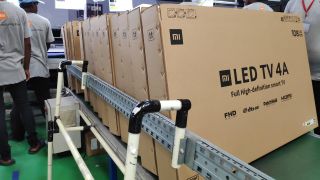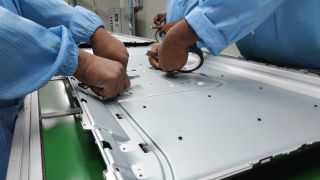Xiaomi expands its Make in India mission to locally manufacture Mi TVs
In partnership with Dixon Technologies

With 6 manufacturing plants running at full operational capacity, Xiaomi will now locally manufacture its TVs as well. This Mi TV manufacturing plant has been built in partnership with Dixon Technologies and spans across 32 acres in Tirupati, Andhra Pradesh. This announcement comes a week after the company was crowned the numero uno brand for smart TVs in India by IDC.
Xiaomi’s 7th manufacturing plant reaffirms the company’s goal towards the Make in India campaign. As such, the Mi TV factory was inaugurated by Chief Minister of Andhra Pradesh, N. Chandrababu Naidu who has been one of the forerunners in bringing foreign IT investments to the state by what he calls the “ease of doing business”. The CM has created an ecosystem within the state of Andhra Pradesh which inspires blue-chip companies like Microsoft, IBM among others to invest in the state, setting up R&D centers or as in this case, manufacturing facilities.
The Mi TV manufacturing plant by Dixon Technologies is a home to more than 850 people and once the whole factory is fully operational, it would be churning out close to 100,000 Mi LED TVs every month. Xiaomi is eyeing Q1 2019 for this target of manufacturing LED TVs in India.
Local manufacture of Mi LED Smart TV 4A 32-inches & 43-inches
The Dixon manufacturing plant in Tirupati will kick off with the local assembly of Mi LED Smart TV 4A 32-inches and 43-inches. Xiaomi also aims to use locally sourced components for its TVs in the near future which will make the whole process more localized, further strengthening Xiaomi’s stronghold in the country.
As to why bigger LED TV4 Pro (55-inches) wasn’t being assembled at the moment in the facility, Manu Kumar Jain - VP, Xiaomi & MD, Xiaomi India revealed that the 55-inch variant of the Mi TV requires a fully automated assembly line with zero human intervention. This is similar to how Xiaomi now manufactures its smartphones in the other 6 factories. Here, Dixon Technologies can help them in automating the TV manufacturing process with its robotic machines.
“After a successful smartphone journey, we are beginning a new chapter with Mi LED TV manufacturing in India. We are already the number one Smart TV brand in India, and we hope that with our increased focus on local manufacturing, we would be able to increase our supply and ensure we can reach out to many more Mi Fans,” Manu Kumar Jain added.
Why Tirupati?

Inaugurating the Dixon Technologies factory, CM N. Chandrababu Naidu laid down his vision for Tirupati to be the next manufacturing hub in Andhra Pradesh. In addition to Xiaomi, companies like Celkon and Micromax have also setup or are on the verge of setting up manufacturing plants in Tirupati.
Get daily insight, inspiration and deals in your inbox
Get the hottest deals available in your inbox plus news, reviews, opinion, analysis and more from the TechRadar team.
The reason for this increased interest, according to CM Naidu is due to the geographical location of the city and the additional perks that come along. Tirupati as a manufacturing and IT hub offers a great combination of air, seaport and roadways connectivity as well.
“Andhra Pradesh continues to lead by example when it comes to Ease of Doing Business and the attractive policies for investors in the state which is attracting blue-chip manufacturers in the field from all over the world. I have a vision of making Tirupati an IT Hub offering a one-stop solution for leading electronics players encompassing the entire life cycle of an ecosystem in electronics from design to death,” said CM N. Chandrababu Naidu.
He went on stating that Tirupati ranks fourth on the ease of living index, sixth when it comes to cleanliness and is the second safest city in India. CM Naidu urged technology companies to use IoT devices, artificial intelligence and analytics for a better regulatory and hassle-free government.
Will the Mi TVs get more affordable?
As the Mi TVs will now be assembled in the country, does that mean that Xiaomi will be in a state to call cuts on the prices of TVs under Make in India? Sadly, not at the moment. While Make in India does give some breathing space when it comes to taxes and duties levied, Manu Kumar Jain stated that the logistics, labor and any other such additional costs that come with TVs increases. The other factor being the current depreciation of the rupee in India.
At one point, Manu hinted that they may, in fact, have to increase the prices of its products if the rupee keeps fluctuating. This won't be new for Xiaomi as earlier this year it increased the prices of some of its products like the Redmi Note 5 Pro and Mi Smart TV 4. It can also be noted here that the company has been very transparent with Make in India and its benefits trickling down to customers. Before this, Xiaomi launched the Mi Power Bank 2i in two capacities which were manufactured here in India and are much more affordable than the ones Xiaomi used to import from China.
Becoming the No. 1 smart TV brand in India
Xiaomi brought its range of smart TVs to India starting with the Mi TV 4 back in February alongside the Redmi Note 5 series. In just around eight months, the company has managed to sell more than 500,000 LED TVs in India which is no small feat. The company has also been able to establish over 650 service centers that are dedicated to Mi TV issues and repairs if necessary. As per IDC's Worldwide Quarterly Smart Home Device Tracker report for Q2 2018, Xiaomi leads the smart TV segment in India after it saw a 3x rise in Mi TV shipments.
The Mi TVs offer a slick TV viewing experience and features the company’s proprietary Patchwall UI which is becoming immensely popular with users. Along with this, the TVs also come loaded with over 700,000+ hours of content but if you want to go the old school way, there’s an option for that as well.
Commenting on the future of Mi TVs and Patchwall UI Manu Kumar Jain said that at some point in the future, Xiaomi will partner with OTT service providers to directly provide content on the Mi TVs. Though Manu clarified that free content will always remain free and it's just the premium services that this platform will cater to so that users don’t have to go through the hassle of subscribing to different OTT services.
- Also Read: The best Amazon Great Indian Festival deals
- Siddharth Chauhan is the Consumer Technology Reporter at Digit India. He used to work as an Assistant Editor at TechRadar India

